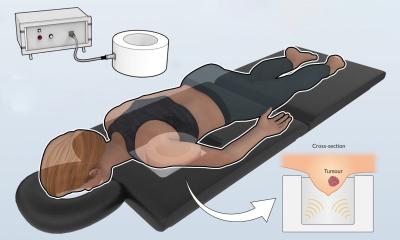
Image source: Chen et al, Oncogene 2023 (CC BY 4.0)
News • Making tumours susceptible to chemo
Breast cancer: target protein may hold key to therapy success
A rare variant of a protein present in nearly all human cells may hold the key to improving the effectiveness of breast cancer treatment, according to University of Manchester research funded by Breast Cancer Now.
This discovery, published in Oncogene, is the first time scientists have identified that targeting RAC1B, a variant of the RAC1 protein, could be a potential way of improving treatment for breast cancer. RAC1 plays a vital role in maintaining the health of all organs so directing cancer treatment against it has rarely been a research focus. But the University of Manchester team led by Dr Ahmet Ucar, discovered that the less common RAC1B variant is particularly important in cancer.
The researchers found that breast cancer stem cells - the cells that are thought to cause cancer’s resistance to treatment, its recurrence and spread - rely on RAC1B. As the absence of RAC1B doesn’t cause any harmful effects to organs, it makes it an attractive target for future breast cancer treatments. When the team transplanted breast cancer cells into mice, they also found the cancer cells lacking RAC1B formed no visible tumours, even after 100 days. Further investigations showed that breast cancer cells grown in the lab without RAC1B didn’t recover after being treated with the chemotherapy doxorubicin. But those cancer cells that retained it made a quick and robust return when the treatment was stopped. And the cancer cells with higher levels of RAC1B recovered faster.
It’s exciting that a variant of a previously overlooked common protein could hold the key to transforming the way we treat breast cancer
Simon Vincent
Looking at clinical data, the researchers also discovered that patients with breast cancer treated with doxorubicin chemotherapy had poorer outcomes if their tumours had higher levels of RAC1B. Dr Ahmet Ucar, Breast Cancer Now research fellow at the University of Manchester, said: “Developing cancer stem cell treatments to target tumours at their root has been a research aim for more than 20 years, but until now has proven elusive. For the first time, our research has shown that without RAC1B, breast cancer stem cells can’t form tumours and become more vulnerable to chemotherapy, making the treatment even more effective. Positively RAC1B isn’t needed for healthy cells so targeting RAC1B with new cancer treatments is unlikely to have severe side effects. We hope that further research will help translate these findings into targeted therapies for breast cancer patients.”
Dr Simon Vincent, director of research, support and influencing at Breast Cancer Now, said: “It’s exciting that a variant of a previously overlooked common protein could hold the key to transforming the way we treat breast cancer. Early-stage discoveries like this can help provide the building blocks for the breakthroughs of the future, leading to new and effective treatments for the 55,000 women and 370 men who are diagnosed with breast cancer in the UK every year.”
Source: University of Manchester
07.01.2023











